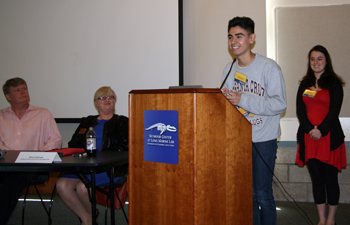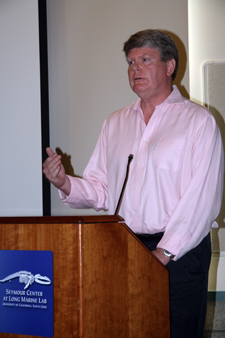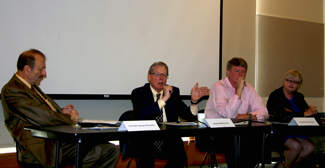Voter approval of Proposition 30 in November gives UC Santa Cruz and the UC system a welcome respite to years of budget cuts but it is not a panacea, state legislators and university administrators agreed Friday at UCSC's annual Legislative Meeting.
It "has given us some breathing room but we are not out of the woods," state Sen. Bill Monning, D-Carmel, said. Monning and Assemblymember Mark Stone, D-Scotts Valley, spoke at the meeting at the Seymour Center along with Chancellor George Blumenthal, Campus Provost/Executive Vice Chancellor Alison Galloway and two student representatives. Approximately 65 campus and community members attended.
Blumenthal said the university has taken its cuts – $56 million in five years – balanced its budget, and been a good steward of public funds. "Yes, we are lean, but our soul is intact," he said. "Prop. 30 does not solve our problems; without some new revenue we are going to be in trouble."
Galloway and Blumenthal called for balanced plan of revenue increases from the state and tuition so the university can plan for the future. Proposition 30 will stabilize budgets in the short term but an additional $7 million must be cut in the next fiscal year and new revenue will be needed in the future to cover mandated cost increases, Galloway said.
Monning and Stone, both Cal grads, expressed support for the university and acknowledged uncertainty with the now-in-effect sequestration in federal spending. California could lose up to 68,000 jobs in the defense industry alone, Monning said. "When you shrink the workforce you shrink the revenue to the state."
Victor Velasco, external vice chair of the Student Union Assembly, urged the legislators to open discussions about 1978's Proposition 13 that slashed property taxes and changed California's fiscal picture ever since.
Budget forum set for March 6
CP/EVC Galloway will offer an online budget forum for faculty and staff from 2:30 to 4 p.m. Wednesday, March 6. The web-based forum can be accessed at the CP/EVC web site and will be recorded and available there.
Monning, elected to the state senate in November after four years in the Assembly, said he is "willing to open that conversation."
Students must be at the table in any future discussions of university budgets and possible tuition increases, Velasco said. Also speaking was Maria Jennings, legislative liaison for the SUA.
Stone, beginning his first term in the Assembly, said he was optimistic about the tenor of discussions in Sacramento. "I'm very hopeful about the conversations on both sides of the aisle," he said.
In describing UCSC's response to budget cuts, Galloway said water and energy conservation will save $750,000 a year after the upfront costs; off-campus lease consolidations have saved $500,000 a year; and changes in support systems have helped reduce the number of staff needed.
Since 2008, ladder rank faculty positions are down 8 percent, other academic positions are down 22 percent, senior management has been cut 23 percent, and general staff 24 percent. Some of cuts were by attrition but 272 staff layoffs were necessary, Galloway said. The effect has been fewer classes, and the restructuring, suspension, and delay of some academic programs.
The Academic Senate is actively looking to the future in how faculty deliver curriculum, she said. The campus already uses online components in many courses and anticipates offering fully on-line courses.
"These are opportunities for the future if the state and the Regents each agree on a multi-year financial plan for UC," Galloway said. "With such a plan, UC Santa Cruz can create its own multi-year path."





